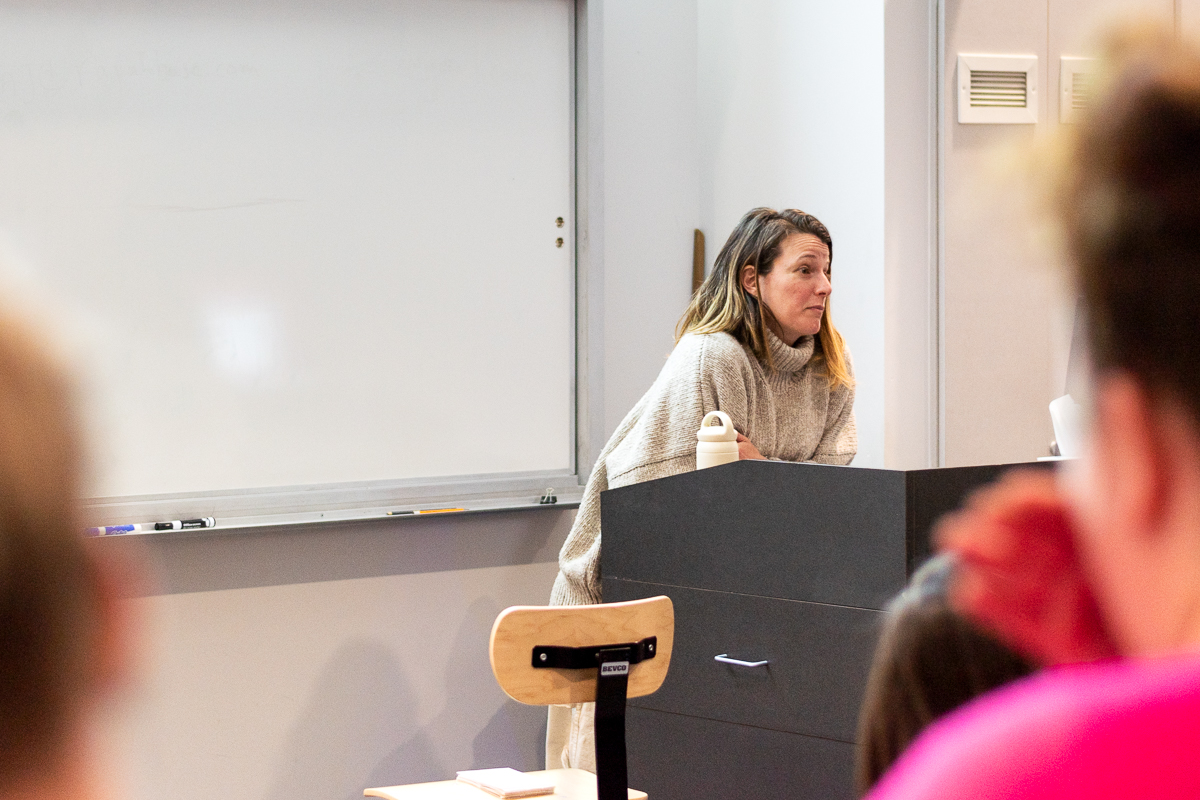McKenna Hoffman thought she had everything figured out. She was going to graduate from Eastern Washington University with a major in English and a dual minor in psychology and French. Then, she was going to get her master’s in teaching and become a teacher in Quebec or France.
But this quarter, she was informed that the French and German minors were being cut — pushing her plans out for years.
In the spring of 2023, The College of Arts, Humanities, and Social Sciences (CAHSS) made the decision to cut the French and German minors from EWU’s course offerings — effectively halving the number of foreign language minors offered. This decision has left students scrambling to amend their degree plans and staff feeling unsure of the university’s values.
Students currently enrolled in 200 level courses in French and German will be able to finish their minors this school year, but those enrolled in the 100 levels will not have the chance to do the same next year.
“It’s getting rid of so many opportunities for students that can’t afford to go to more expensive schools,” said Hoffman. “There are so many New York jobs, There are so many international schools, there are so many things where if we take away this big language, all of these other jobs are taken away too.”
Hoffman also questioned whether or not she would be staying at the university.
“I could study abroad maybe [to get the minor], but that’s like $20,000 for everything. I could go to a different school — that sucks,” she said.
For Persaya Sevey, a running start student at EWU, the loss of the French minor option has pushed her to reconsider even pursuing a bachelor’s degree at the school.
“I was planning on getting an English major and minoring in French so I could teach English as a foreign language and get my TEFL [Teaching English as a Foreign Language Certificate]. I can’t really do that if I can’t get a French minor,” she said.
The decision to remove the minors was received with worry by the foreign language faculty.

Dr. Natalia Ruiz-Rubio, Director of Modern Languages and Literatures at EWU, has written a statement to the Dean of CAHSS encapsulating the department’s stance. It said they are “deeply concerned about eliminating the French and German minors,” and requests that the Dean of CAHSS reconsider their decision as it “impacts students’ options to develop global and other cognitive competencies.”
Florian Preisig, the acting Dean of CAHSS, said in an interview with The Easterner that low enrollment rates in the courses and budget deficit were the reason for the cut. This quarter, there are only 20 students enrolled in German 101 compared to a pre-pandemic 36. When the decision to cut the minor was made, there were 12 enrollments. The situation is similar for French.
“[Nationally], Spanish is down 15%, French down by 20%, and German is down by 32%. It is sad because French, Spanish and German are down, but it’s also sad because all the languages are down. American students don’t take languages as much as they used to,” he said.
Ruiz-Rubio argues the university should not be relying on post-pandemic enrollment rates when deciding to cut programs.
“My argument to the Dean’s office is that you cannot discontinue this program based on three, four, five years of enrollment without looking at a program revision and looking at what is going on in different ways,” Ruiz-Rubio said. “So, what I did propose is that we look at the program and suggest a program review, which is currently something that the university is undergoing for every program anyways.”
In 2022, State Superintendent of Public Instruction Chris Reykdal announced that there are plans to have dual-language programs available to all Washington K-8 students by the year 2040. This follows the implementation of the seal of biliteracy, and the 2019 implementation of 2 years of language courses requirement for high schoolers.
Ruiz-Rubio believes that the removal of the minors goes against these pushes from the state to increase bilingual education, and creates problems for students who need to fulfill existing language requirements.
“[Study of a foreign language] was a high school requirement, but many students could not finish it [due to COVID] and they were admitted into Eastern or any other university on ‘probation.’ But then, the university is looking at how to implement that. So this, in my opinion, doesn’t align with the state plans of making this state more bilingual,” Ruiz-Rubio said.
But Preisig cites the states’ push towards biliteracy as potentially part of the problem for low enrollment in the college courses.
“When high school students come to Eastern, they should have already taken two years of a language so they don’t need to satisfy our requirement. So we are in a situation in which most of our students in language classes are taking the class because they have a passion for the language, which is great, but it does not fill the class,” Preisig said.
American Sign Language is the one language that is an exception to the decrease in enrollment, being up by over 4%. Preisig thinks that if this trend continues, EWU may be able to create a minor in that area.
“Students are no longer interested in German or French like they were years ago, but they are interested in sign language. So maybe that is where we should invest the money,” Preisig said.
There are currently no plans for an ASL minor though, leaving very limited options for those who need or want to pursue a minor in a foreign language.
“There are degrees which require a language minor, like international affairs or English as a second language. So now those students are going to have only two choices — Spanish or Japanese,” Ruiz-Rubio said. “But I think that the impact on the campus is a bigger issue. It is what we are losing as an institution in our mission to enhance personal growth.”
In response to the emotional impact made by the decision to cut the minors, Preisig brings up Eastern’s financial difficulties.
“Programs are going to be cut in about a year and a half, and a lot of programs that students and faculty are passionate about will be cut. So we don’t have a choice. We have to make cuts to stay within our budget, because the structural deficit at Eastern is approximately 15 million dollars,” he said. “In the last six years we have lost about a third of the undergraduate population, so there has to be consequences.”
Still, Ruiz-Rubio believes the programs deserve another look before their removal.
“There is no time to really have a discussion on this. And at the end of the day, if the university decided that we are going to discontinue this program, fine, but at least let’s have a conversation about it,” she said.






















